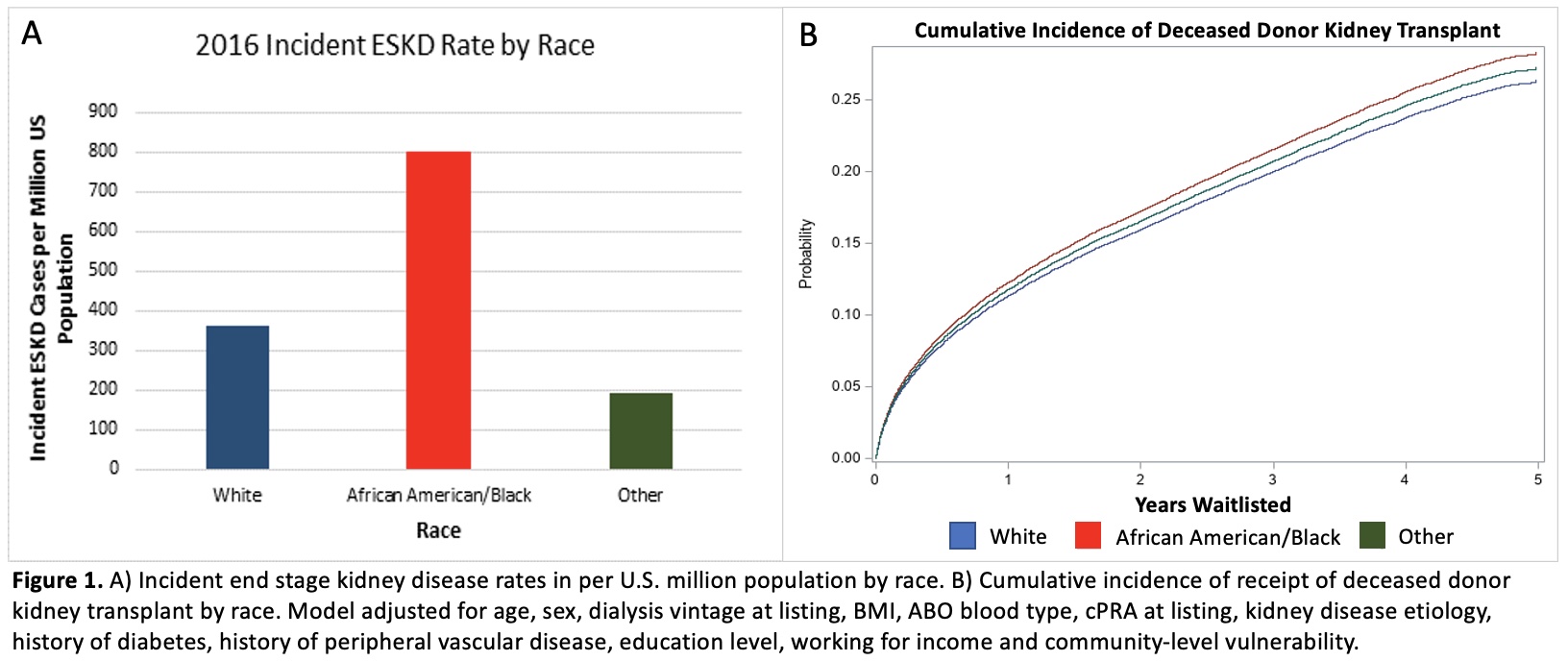Kidney Allocation System Promotes Racial Equality Not Equity in Access to Deceased Donor Kidney Transplantation
1University of Alabama at Birmingham, Birmingham, AL, 2Weill Cornell Medical College, New York City, NY
Meeting: 2022 American Transplant Congress
Abstract number: 1753
Keywords: Kidney, Organ Selection/Allocation
Topic: Clinical Science » Kidney » 50 - Health Equity and Access
Session Information
Session Time: 7:00pm-8:00pm
 Presentation Time: 7:00pm-8:00pm
Presentation Time: 7:00pm-8:00pm
Location: Hynes Halls C & D
*Purpose: While the 2014 Kidney Allocation System (KAS) reduced deceased donor kidney transplant (DDKT) racial disparities, candidates’ community-level vulnerability has not been considered. The purpose of this study was to evaluate racial equity within KAS accounting for patient- and community-level characteristics.
*Methods: US Renal Data System and US Census data were used to calculate 2016 incident ESKD rates. The Scientific Registry of Transplant Recipients was utilized to identify adult kidney transplant candidates (1/1/2016-12/31/2016). Candidates’ zip codes were linked to the Centers for Disease Control and Prevention 2016 Social Vulnerability Index. Candidates were followed from listing to transplant, death, waitlist removal, or end of study (01/01/21). Fine-Gray competing risks regression was used to evaluate the association between race and DDKT.
*Results: 125,134 incident ESKD patients were included. Incidence rates among African American/Black (AAB), white and other races were 800, 361 and 193 per million population, respectively (Figure 1A). The 33,492 candidates were 62% white, 29% AAB, and 10% another race. Compared to white candidates, AAB candidates had 9% higher likelihood (aHR: 1.09, 95%CI: 1.04-1.14) and other race candidates had similar likelihood of DDKT (aHR: 1.04, 95%CI: 0.97-1.12) independent of community-level vulnerability (Figure 1B).
*Conclusions: While AABs had a 2.2-fold higher ESKD incidence rate compared to white counterparts, AAB candidates had only minimally improved access to DDKT. These results suggest KAS promotes racial equality, though additional allocation and upstream process changes are needed to achieve racial equity.
To cite this abstract in AMA style:
Killian C, Shelton B, MacLennan P, McLeod M, Carter A, Reed R, Qu H, Orandi B, Kumar V, Sawinski D, Locke J. Kidney Allocation System Promotes Racial Equality Not Equity in Access to Deceased Donor Kidney Transplantation [abstract]. Am J Transplant. 2022; 22 (suppl 3). https://atcmeetingabstracts.com/abstract/kidney-allocation-system-promotes-racial-equality-not-equity-in-access-to-deceased-donor-kidney-transplantation/. Accessed February 18, 2026.« Back to 2022 American Transplant Congress

